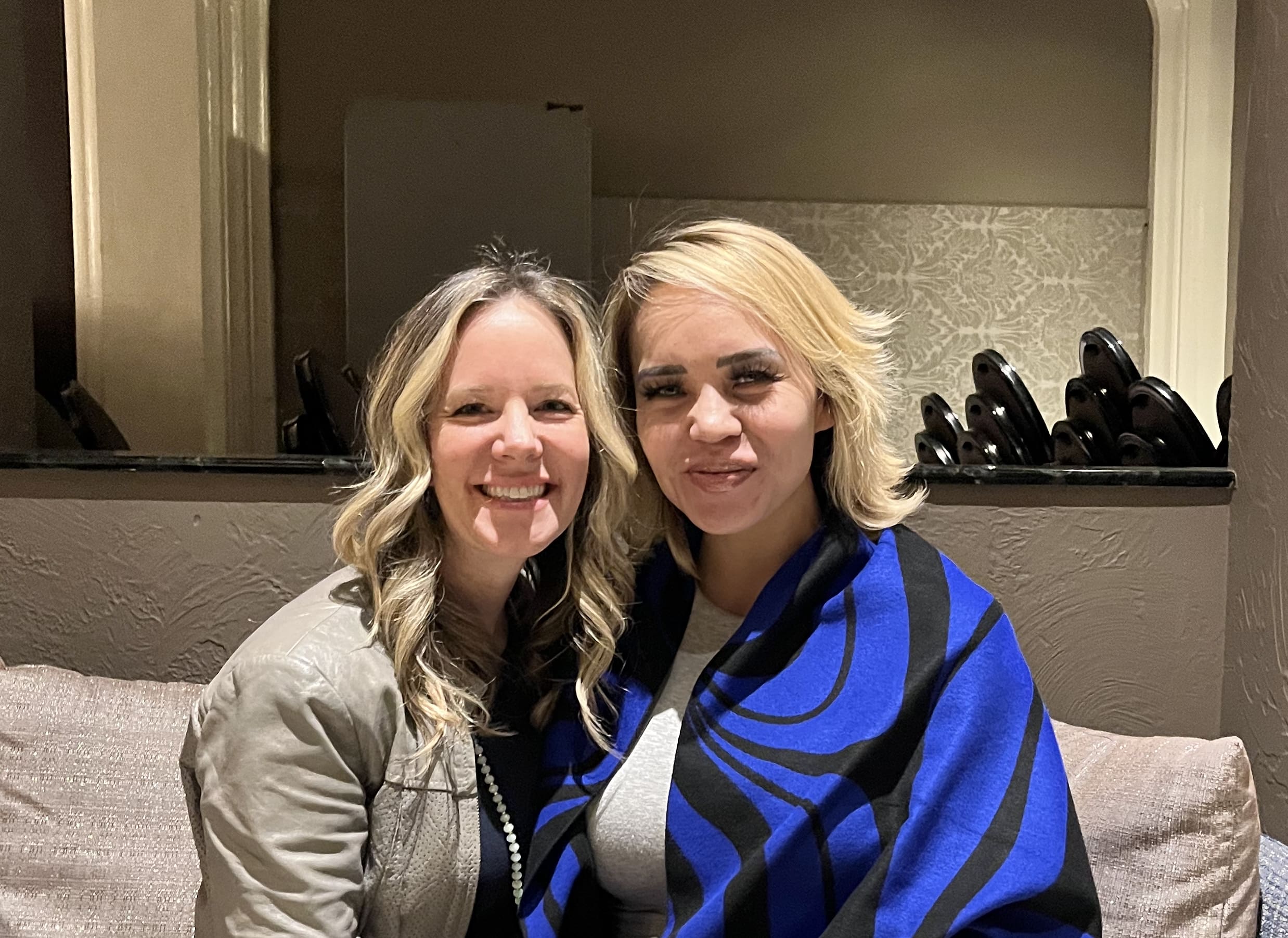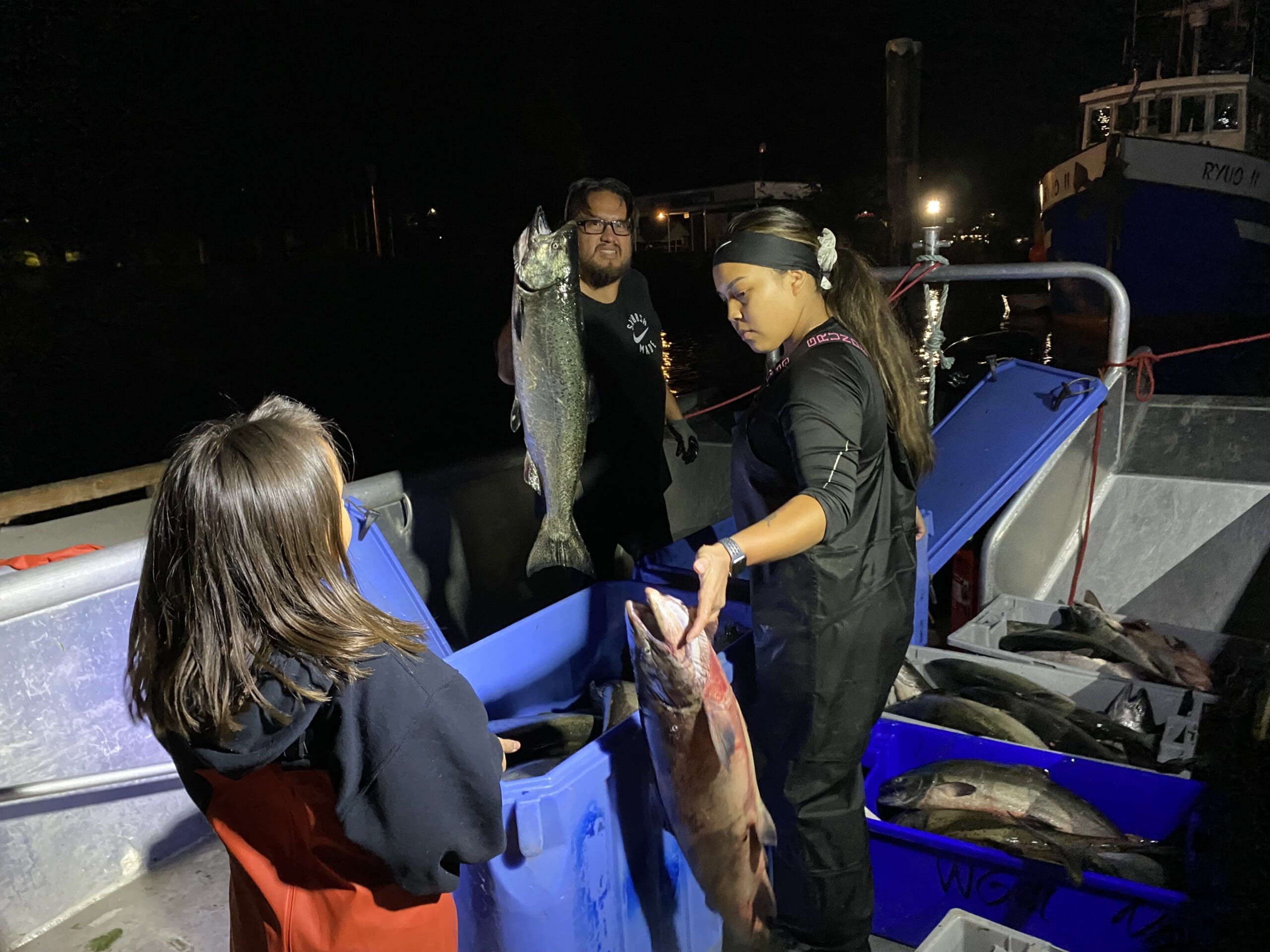Celebrating Natasha Marshall Gallic - A Strong, Proud Tseshaht Fisher
NewsThis International Women’s Day we celebrate Natasha Marshall Gallic, a role model woman who challenges the status quo, defies stereotypes, has a passion for reinventing for justice, and is a constant source of inspiration.

For International Women’s Day this year, I want to celebrate my friend Natasha Marshall Gallic, a role model woman who challenges the status quo, defies stereotypes, has a passion for reinventing for justice, and is a constant source of inspiration to me. Among her many talents, Natasha fishes for salmon for her family, her community, and for Skipper Otto members, and I feel very lucky to have her in our Skipper Otto community and as a friend.
Natasha is a strong, proud Tseshaht woman in a long line of them. Her traditional name, which was also her great great grandmother’s is Qua Qua ilth - which means seated in a particular place in a canoe or longhouse. She was raised by her mom and her grandma and is raising her two daughters with the same pride and values. I was first introduced to Natasha by another inspiring Tseshaht woman, Jocelyn Dick when we started working with them both in the summer of 2021. (You can read a few of my blogs about her here and here).
 I’ll never forget that warm summer morning in August when Natasha, her daughter Mercedes, and her brother, Willard, delivered their first load of fish to us at our processor in Richmond. Natasha offhandedly mentioned that, in addition to fishing all night the night before, and single-parenting two daughters, and sitting on her band council, she was also starting her Executive MBA in Indigenous Business Leadership at SFU. I was grateful when she and her daughter and brother accepted my invitation to lunch. I had so many questions for her! And she had a lot for me, too. Mostly we talked about our values, what drives us to get up in the morning. We talked about the dark impacts of colonialism on generations within her family and community, and the strong cultural connections and beliefs that hold them together; about our shared belief in the importance of hii-shuk-tsawuk – the interconnectedness of all things; about our mutual love of the sea and weightlifting and our kids; and about our shared belief that business can be used as a tool for social change.
I’ll never forget that warm summer morning in August when Natasha, her daughter Mercedes, and her brother, Willard, delivered their first load of fish to us at our processor in Richmond. Natasha offhandedly mentioned that, in addition to fishing all night the night before, and single-parenting two daughters, and sitting on her band council, she was also starting her Executive MBA in Indigenous Business Leadership at SFU. I was grateful when she and her daughter and brother accepted my invitation to lunch. I had so many questions for her! And she had a lot for me, too. Mostly we talked about our values, what drives us to get up in the morning. We talked about the dark impacts of colonialism on generations within her family and community, and the strong cultural connections and beliefs that hold them together; about our shared belief in the importance of hii-shuk-tsawuk – the interconnectedness of all things; about our mutual love of the sea and weightlifting and our kids; and about our shared belief that business can be used as a tool for social change.
After the busy fishing season ended, we started monthly co-mentorship calls. As Natasha put it, we are two strong women with strong tlimaxti – soul or self – and that’s why we’re drawn to work together. We’re always collaborating about how to do good work in the world and these calls have been a constant source of inspiration for me.
One of the things Natasha has shared with me is a deeper understanding of what fishing meant to her growing up and what it means to her community. She was raised outside her community by a single mom and grandma, but she always came back to the community, in Port Alberni, for each fishing season.
“Being on the water felt like the community I’d been missing.”
Fishing was her connection to her dad, Rocky, and all her relations. Starting as a deck-hand on Rocky’s boat, each season she developed her skills and gained more confidence on the water, while learning about the importance of feeding her community. With a mind for business, Natasha knew she wanted to go out on her own. She bought her first 18 foot aluminum boat with cash. Years later, she knew she wanted to grow her family business. She dreamed even bigger, and together with her brother, they designed a beautiful 22 foot custom welded aluminum boat, built in Port Alberni, by a local fabricator.
“The more you invest in yourself, the more you get out of life and your business.”
Being one of only a few female fisher’s in her community, and the sense of pride Natasha felt when providing traditional food for her family outside of the community . . . “Well, you just can’t beat that feeling!” Natasha told me with pride. Whenever she or her grandma or mom would pull a piece of salmon from the freezer, Natasha would feel the connection to her land and all her relations.
When her daughters were born, Natasha knew it was critical that they have a connection to their ancestral community and it felt natural that fishing should be part of their lives.
“The whole reason I went to school, why I sat on council, all of it is to show my daughters that having Indigenous identity is central, and it’s the most important lesson I was taught.”

This understanding of identity is her life’s work: ensuring her daughters know the long line of strong Indigenous women they come from; teaching them to be proud of where they came from; and the importance of breaking stereotypes,“that you can do anything that you put your mind to, regardless of gender.” Natasha shared with me that her daughters attended the band school where they learned Tseshaht language, songs, traditions, stories, and culture. And, of course, to fish. And the learning goes both ways: “My girls are teaching me our language! They know more than I do,” she told me. “I’m so proud of them.”
A couple of weeks ago, Natasha and I both attended the CFE Gathering in Vancouver – a meeting of managers of Indigenous Commercial Fishing Enterprises from around BC. This was the third conference we attended together in the last couple of years and, as always, it was incredibly inspiring. After the first day’s sessions, we went for dinner to workshop Natasha’s masters’ thesis project that we’ve been discussing for over a year now: how the Skipper Otto model could be used to equitably distribute community home-use fish to Indigenous folks living both within and outside of their communities. Natasha wants to ensure that other Indigenous folks can be connected to their communities through their culturally significant traditional food source – the salmon – just as she was. And she has big dreams of building a model that can be replicated in Indigenous communities throughout BC and beyond. Her application of the Skipper Otto model to achieve this is profoundly beautiful and deeply humbling. I can’t wait to see her thesis come together this month, to watch her company miʕaat (which means sockeye salmon) come to fruition, and to be there for her first salmon pick-up for her Tseshaht nation members.
Written by: Sonia Strobel
